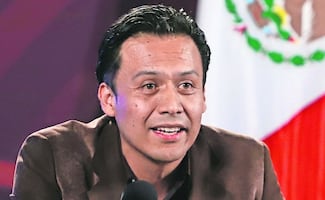Más Información

La golpiza a Nicole y el apuñalamiento a Jeremy; los casos de agresiones a estudiantes que marcan a secundaria en Tláhuac

Cae "El Braca", jefe de plaza del CJNG en Zacatecas; esta fue la causa del operativo cerca de la propiedad de los Aguilar

SEP destituye a Marx Arriaga, titular de la Dirección General de Materiales Educativos; niega desalojo de oficinas

Fiscalía investiga como feminicidio la muerte de Blanca Esthela Álvarez, regidora en Jalisco; descarta robo
Colorado immigrant advocates frustrated over long waiting periods for people who want driver's licenses regardless of their legal status vowed to pressure lawmakers in the coming months to free up money so the program can meet demand.
A coalition of immigrant rights groups said this week that they would be lobbying lawmakers to allow more offices to issue the special licenses, but they will have a difficult time convincing Republicans who dislike the program and have gained control over half of Colorado's Legislature.
The GOP has fought back in other states that give licenses to those in the U.S. illegally or with temporary legal status. In New Mexico, Republican Gov. Susan Martinez, the nation's only Latina governor, has tried to repeal the law a number of times, but her efforts have stalled in the Democratic-controlled Senate.
Ten states and the District of Columbia have such programs, which supporters say help keep immigrants insured and informed about the rules of the road. Opponents argue that the licenses condone illegal behavior.
In Colorado, Democrats who approved the program two years ago without Republican support are now facing a GOP-controlled state Senate. That has given Republicans power over whether to authorize the state Department of Revenue, which oversees motor vehicle offices, to allocate money toward additional license appointments.
Immigrants are waiting months to get specialized driver's licenses and identification cards through three offices. They are charged more than legal residents, and the fees they pay fund the program.
"None of these hikes in rates have helped our community," said Victor Galvan, Denver organizer for the Colorado Immigrant Rights Coalition. "That money belongs to the community."
The special driver's licenses cost US$50.50, compared with the US$21 that legal residents pay. Immigrant identification cards are US$14, also higher than the US$10.50 paid by everyone else.
Galvan's organization and other immigrant advocates, including Mi Famila Vota and Driver's Licenses for All, plan to begin lobbying legislators next month as they start work on a new state budget.
Colorado vastly underestimated the initial surge in demand for the licenses, a problem Democrats are now facing.
Since the program became operational in August 2014, 14,299 immigrants have received driver's licenses and an additional 2,218 have received driving permits, according to state figures. An additional 2,278 have gotten ID cards.
"We believe it's fully funded - fully funded to the law that was passed," said Republican Sen. Kent Lambert, who chairs the budget-writing Joint Budget Committee.
But immigrant groups say many more are waiting for licenses. Appointments are being booked 90 days in advance.
"Demand for this program has been very high," said Daria Serna, spokeswoman for the Colorado Department of Revenue. "Once appointments are released, they usually go very quickly and we do not have appointments go unclaimed. Our available resources do not allow us to serve everyone interested in this program in a timely manner."
However, she also notes that people are not showing up - there have been more than 5,000 missed appointments since the program launched.
Back then, appointments were handled at five locations. The Department of Revenue asked in January to spend US$166,000 in program fees to permanently hire some temporary workers and potentially expand to other offices to address high demand.
The department is now operating three offices under a compromise that party leaders struck in March to allow the agency to use US$66,000 in fees.
Colorado has 180,000 residents in the country illegally, according to the Pew Charitable Trusts, which released a study in August on the states that allow driver's licenses regardless of legal status.
Noticias según tus intereses
[Publicidad]
[Publicidad]










